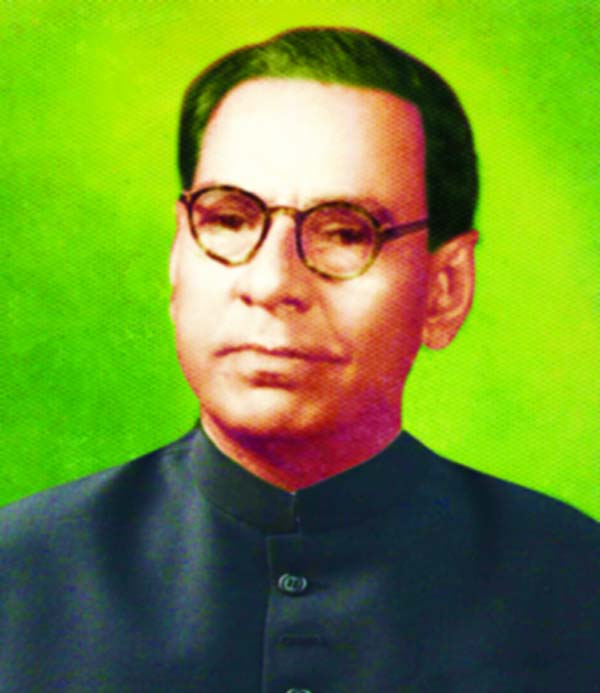
Literature Desk :
Abul Mansur Ahmed (3 September 1898 – 18 March 1979) was a writer, politician and journalist. He was awarded Bangla Academy Literary Award in 1960 and Independence Day Award in 1979 by the Government of Bangladesh. Amar Dekha Rajnitir Ponchash Bochhor (1969) is his magnum opus.
Abul Mansur Ahmed’s maternal grandfather Meherullah Faraizi took part in the non-communal anti-British Faraizi movement. Ahmed was born in Dhanikhola in Mymensingh to Abdur Rahim Farazi and Mir Jahan Begum. He passed the Matriculation exam from Nasirabad Mrittunjoy Bidyaloy in 1917 and the Intermediate exam from Jagannath College in 1919. Then he completed Bachelor of Arts from Dhaka College in 1921. He studied Law at Ripon College, Calcutta (later renamed Surendranath College) and passed the BL examination in 1929. He got involved in Khilafat and Non-Cooperation movements.
During 1929-1938 he practiced law in Mymensingh. Later, he worked at Calcutta as a professional journalist and a political activist until the 1947 partition. He worked for The Krisok, Nobojug, Ittehad, Soltan and Mohammadi.
Abul Mansur Ahmed joined the Congress movement. He became an active member of the Muslim League after the elections of 1937 and became an activist of the Pakistan movement since 1940. In 1954 United Front election he became elected Member of Parliament from Trishal, Mymensingh constituency. He was the principal author of 21-Point Program, the Election Manifesto of Jukta Front in 1954. He was the provincial Education Minister in the United Front Cabinet under A. K. Fazlul Huq and the central Commerce and Industries Minister and Deputy Prime Minister of the Awami League government of Prime Minister Huseyn Shaheed Suhrawardy in 1957. He was imprisoned when Martial Law was declared by General Ayub Khan in 1958 and was released in 1962.
Works:
Novels: Sotyo Mithya (1953), Jibon Ksudha (1955), Ab-e-Hayat (1968), Chouchir, Prodip o Potongo.
Satires: Ayna (1936-1937), Food Conference (1944), Gulliverer Sofor Nama, Asmani Purdah.
Reminiscence: Atmokotha (1978, autobiography), Amar Dekha Rajnitir Ponchash Bochhor (1969), Sher-e-Bangla hoite Bangabandhu (1972), Bangladesher Culture.
Awards: Bangla Academy Literary Award (1960), Independence Day Award (1979), Nasiruddin Gold Medal.
Abul Mansur Ahmed (3 September 1898 – 18 March 1979) was a writer, politician and journalist. He was awarded Bangla Academy Literary Award in 1960 and Independence Day Award in 1979 by the Government of Bangladesh. Amar Dekha Rajnitir Ponchash Bochhor (1969) is his magnum opus.
Abul Mansur Ahmed’s maternal grandfather Meherullah Faraizi took part in the non-communal anti-British Faraizi movement. Ahmed was born in Dhanikhola in Mymensingh to Abdur Rahim Farazi and Mir Jahan Begum. He passed the Matriculation exam from Nasirabad Mrittunjoy Bidyaloy in 1917 and the Intermediate exam from Jagannath College in 1919. Then he completed Bachelor of Arts from Dhaka College in 1921. He studied Law at Ripon College, Calcutta (later renamed Surendranath College) and passed the BL examination in 1929. He got involved in Khilafat and Non-Cooperation movements.
During 1929-1938 he practiced law in Mymensingh. Later, he worked at Calcutta as a professional journalist and a political activist until the 1947 partition. He worked for The Krisok, Nobojug, Ittehad, Soltan and Mohammadi.
Abul Mansur Ahmed joined the Congress movement. He became an active member of the Muslim League after the elections of 1937 and became an activist of the Pakistan movement since 1940. In 1954 United Front election he became elected Member of Parliament from Trishal, Mymensingh constituency. He was the principal author of 21-Point Program, the Election Manifesto of Jukta Front in 1954. He was the provincial Education Minister in the United Front Cabinet under A. K. Fazlul Huq and the central Commerce and Industries Minister and Deputy Prime Minister of the Awami League government of Prime Minister Huseyn Shaheed Suhrawardy in 1957. He was imprisoned when Martial Law was declared by General Ayub Khan in 1958 and was released in 1962.
Works:
Novels: Sotyo Mithya (1953), Jibon Ksudha (1955), Ab-e-Hayat (1968), Chouchir, Prodip o Potongo.
Satires: Ayna (1936-1937), Food Conference (1944), Gulliverer Sofor Nama, Asmani Purdah.
Reminiscence: Atmokotha (1978, autobiography), Amar Dekha Rajnitir Ponchash Bochhor (1969), Sher-e-Bangla hoite Bangabandhu (1972), Bangladesher Culture.
Awards: Bangla Academy Literary Award (1960), Independence Day Award (1979), Nasiruddin Gold Medal.

